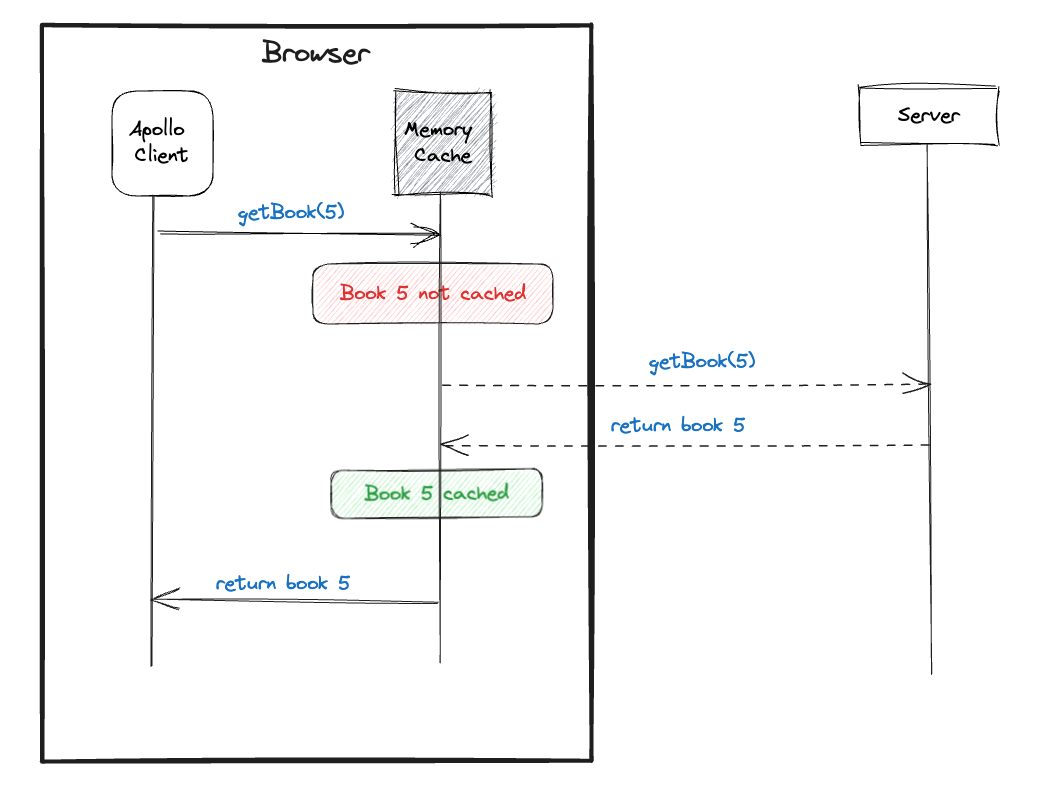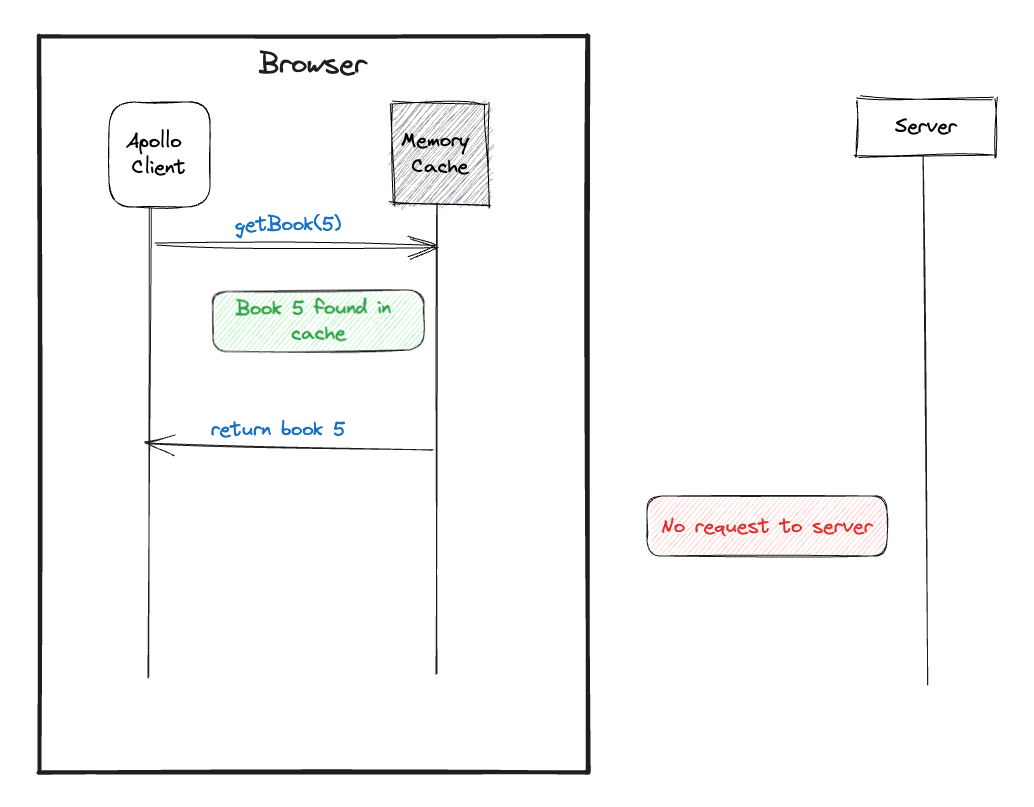- Context
- How Apollo Caches Requests
- Viewing Cache
- Adding Items to the Cache
- Handling Parameterized Queries
- Deleting Cache Items
This cheat sheet covers the most common use cases for managing Cache in Apollo Client, using a book library app as an example.
Checkout the repo or playground to see how I used the concepts in this guide:
enum Category {
FICTION
NON_FICTION
BIOGRAPHY
SPORTS
}
type Query {
books(filter: BookFilter): [Book]
book(id: String!): Book
}
type Book {
id: String!
title: String!
categories: [Category]
}
type Mutation {
addBook(title: String!, categories: [Category]): Book
updateBook(id: String!, title: String!, categories: [Category]): Book
deleteBook(id: String!): Boolean
}
input BookFilter {
category: Category
}
const books = [
{ title: "To Kill a Mockingbird", categories: ["FICTION"] },
{ title: "1984", categories: ["FICTION"] },
{ title: "Harry Potter and the Sorcerer's Stone", categories: ["FICTION"] },
{ title: "The Great Gatsby", categories: ["FICTION"] },
{ title: "The Diary of a Young Girl", categories: ["BIOGRAPHY"] },
{ title: "The Catcher in the Rye", categories: ["FICTION"] },
];Initialize your Apollo client with InMemoryCache.
import { ApolloClient, InMemoryCache } from "@apollo/client";
const client = new ApolloClient({
uri: "https://your-api-endpoint.com",
cache: new InMemoryCache()
});When you query a book for the first time, Apollo initiates a network request.
All subsequent requests of the same type will hit the cache
To view the cache, use:
window.__APOLLO_CLIENT__.cache.extract()in your browser console- Download Apollo Client Devtools
By default, cache identifiers have the format <__typename>:<id>. For example, if you're querying a Book with an id of harry-potter, the cache would store it as "Book:harry-potter".
{
"ROOT_QUERY": {
"__typename": "Query",
"books": [
{
"__ref": "Book:harry-potter"
},
{
"__ref": "Book:lord-of-the-rings"
}
]
},
"Book:harry-potter": {
"__typename": "Book",
"id": "harry-potter",
"title": "Harry Potter"
},
"Book:lord-of-the-rings": {
"__typename": "Book",
"id": "lord-of-the-rings",
"title": "Lord Of The Rings"
},
}Long Way: Using readQuery and writeQuery
const [addBook] = useMutation(
ADD_BOOK,
{
update(cache, { data: { addBook } }) {
const { books } = cache.readQuery({ query: GET_BOOKS });
cache.writeQuery({
query: GET_BOOKS,
data: { books: books.concat([addBook]) },
});
}
}
);Short Way: Using updateQuery
const [addBook] = useMutation(
ADD_BOOK,
{
update(cache, { data: { addBook } }) {
const query = GET_BOOKS;
cache.updateQuery({query}, (data) => ({
books: [...data.books, addBook]
}));
}
}
);Long way:
const [mutate] = useMutation(ADD_BOOK, {
update(cache, { data }) {
const newBook = data?.addBook;
cache.modify({
fields: {
books(prevBooks) {
const newBookRef = cache.writeFragment({
data: newBook,
fragment: gql`
fragment NewBook on Book {
id
title
}
`,
});
return [...prevBooks, newBookRef];
},
},
});
},
});Simpler way
const [mutate] = useMutation(ADD_BOOK, {
update(cache, { data }) {
const newBook = data?.addBook;
cache.modify({
fields: {
books(prevBooks, { toReference }) {
return [...prevBooks, toReference(newBook)];
},
},
});
},
});Difference between toReference and writeFragment
The toReference function returns a reference to a cache object that already exists, while writeFragment writes an object to the cache and then returns its reference. It is important to remember that any results returned by mutations or queries are first cached before being returned to the client. This is why toReference works.
Handling pagination or filters/sorts can be done by parsing the storeFieldName provided in your field function.
Example: Say I ran the following queries to filter books by category:
getBooks(category: 'FICTION')
getBooks(category: 'BIOGRAPHY')The cache will look like the following:
{
"ROOT_QUERY": {
"__typename": "Query",
"books({\"filter\":{\"category\":\"FICTION\"}})": [
{ "__ref": "Book:to-kill-a-mockingbird" },
{ "__ref": "Book:1984" },
{ "__ref": "Book:war-and-peace" },
{ "__ref": "Book:the-odyssey" }
],
"books({\"filter\":{\"category\":\"BIOGRAPHY\"}})": [
{ "__ref": "Book:the-diary-of-a-young-girl" },
{ "__ref": "Book:steve-jobs" },
]
}
}Let’s say you wanted to add a new book to the list eg:
addBook({ variables: { title: 'Benjamin Franklin', categories: ["BIOGRAPHY"] } });How do you update the cache?
The wrong way:
addBook({
variables: { title:"Benjamin Franklin", category: "BIOGRAPHY"}
},
update: (cache, {data}) => {
cache.modify({
fields: {
books: (previous, { toReference }) => (
[...previous, toReference(data.addBook)]
)
}
});
}
})Why? this will add the new book in all the categories but we only want to add this book to the BIOGRAPHY category.
Solution:
Parse the storeFieldName that is provided in your field function. You can use the following utility function:
/**
* Takes in storeFieldName eg "books({"filter":{"category": "BIOGRAPHY"}})"
* Returns { "filter":{"category": "BIOGRAPHY"}}
*/
function getParamsFromStoreFieldName(storeFieldName) {
try {
// find the index of the first & last curly bracket
const first = storeFieldName.indexOf('{');
const last = storeFieldName.lastIndexOf('}');
// check if curly brackets were found
if (first === -1 || last === -1) {
throw new Error('No parameters found in the provided storeFieldName.');
}
// extract the params
const json = storeFieldName.slice(first, last + 1);
// attempt to parse the SON
return JSON.parse(json);
} catch (error) {
console.error(`Failed to parse parameters from storeFieldName: ${error.message}`);
return null;
}
}Using getParamsFromStoreFieldName
const [addBook, { data }] = useMutation(ADD_BOOK, {
update(cache, { data: { addBook } }) {
cache.modify({
fields: {
books(previous, { toReference, storeFieldName }) {
// storeFieldName = books({"filter":{"category": "BIOGRAPHY"}})
const params = getParamsFromStoreFieldName(storeFieldName);
if (params?.filter?.category) {
const category = params.filter.category;
if (category === addBook.category) {
return [...previous, toReference(addBook)];
}
} else {
// If no filter is applied or the filter is not based on category, just append the new book
return [...previous, toReference(addBook)];
}
return previous;
}
}
});
}
});Best way to delete cache items. Note: cache.evict and cache.gc
const [deleteBook] = useMutation(DELETE_BOOK_MUTATION, {
update(cache, { data }) {
if (data.deleteBook) {
cache.modify({
fields: {
books(existingBooks, { readField }) {
return existingBooks.filter(
(bookRef) => readField('id', bookRef) !== data.deleteBook.id
);
},
},
});
/*
Clean up:
Remove the specified cache object from the cache along with all references to it
on any other cache objects.
*/
cache.evict({ id: cache.identify(data.deleteBook) });
cache.gc();
}
},
});

